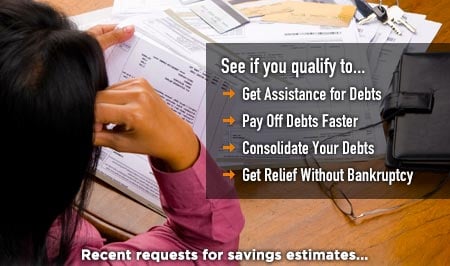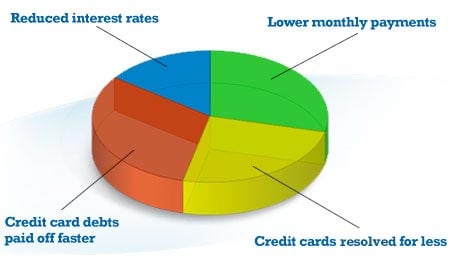
Government Debt Relief?
It's easy to understand the false hopes of many consumers - especially those mired in deep credit card debt - that government is or will provide a bailout program...a bailout-type of relief. The fact is, government has poured billions into helping rescue banks and financial institutions. Any hope of a government bailout program for consumers is not based on facts or reality. There are no credit card debt relief grants or aid to help pay off, reduce or eliminate credit card debt.
Fortunately for New Yorkers in need of credit card debt relief, there are debt relief options available, including debt management programs, debt consolidation programs, and even debt negotiation or debt settlement programs -- but these are not government programs but debt relief solutions that rely on possible concessions that the credit card companies themselves may be willing to extend to consumers going through finnancial hardhship. Depending on the debt assistance or relief you need, consumers may be able to benefit from reduced interest rates, removal of penalties and late fees and even debt settlement for less than what is owed.
Debt relief is available. However, every person's individual or family situation is different. To discover how debt relief may be able to help you, get your free debt analysis and savings quote.
Government Debt Help for Consumers
Despite the fact that the government does not provide any kind of direct relief in the form of debt consolidation, credit counseling, or debt-grant programs to payoff credit cards, there is legislation which both supports and protects consumer rights. The following is short recap of what's being done in recent years by government to help consumers better manage and understand their debt.
Credit Card ACT of 2009
Record-high levels of unsecured, consumer debt brought-on in large part by aggressive credit card company marketing and sales efforts, contributed to the debt-malaise our consumer-society finds itself in. While consumers should assume the responsibility of meeting debts incurred, the relentless practices and easy-credit approval of the last decade largely driven by credit card companies, played a large part in getting us to where we are today. Part of the government's response to curb future abuse, was to create The Credit Card Accountability Responsibility and Disclosure Act of 2009.
Fact Sheet Reforms to Protect American Credit Card Holders
Although falling short of putting controls and restrictions on prices, fees, and interest rate caps that credit card companies were allowed to set or charge, the law did create a higher level of protection and other noteworthy consumer provisions. The legislation demonstrated how government can assist consumers by holding credit card companies more accountable for any of a number of credit card marketing and disclosure abuses.
Prior to the legislation and as a result of spiraling debt, citizens and politicians around the nation agreed the flourishing credit card industry's unmitigated efforts had simply gone too far. Arbitrary rate increases, lack of adequate or advance warnings about such increases, difficult to read credit card agreements and disclosures, along with the controversial and contemptible Universal Default - all were contributing factors leading to the present day unsecured consumer debt crisis.
The Credit Card Act of 2009 mandates that credit card companies give consumers a 45-day advance notice for impending rate increases. In addition, if the cardholder decides he or she wants to cancel the card, they're allowed to pay off the balance at the old rate...not the new, escalated rate level. The Act also prevents creditors from retroactively raising interest rates for cardholders who were not in default nor late on payments or anything deemed negative related to the card in question. Under the Universal Default provision, one credit card company could raise a cardholder's interest rates based on a change in overall profile. Say, for example, you're paying a 9% interest rate on a credit account making up-to-date payments, keeping an unblemished, perfect track record on that card. Imagine, because a car is purchased, or you've recently applied for credit elsewhere, or perhaps you've been late on a different credit card, your "manageable" 9% interest rate sky-rockets to 29%. Such predatory practices, under Universal Default, gave credit card companies a bad name while harming and undermining the best interests of consumers.
So even though the government does not provide debt relief in the form of debt consolidation or debt relief grants, or any other programs aimed at personal debt, it's clear that the Credit Card Act is a positive step in the right direction to help consumers avoid getting into debt in the first place.
Mortgage Debt Relief
Another government program aimed at helping consumers impacted by the sub-prime credit implosion is FHASecure, a loan program administered by HUD, the U.S. Department of Housing and Urban Development. Its objective is to assist homeowners facing possible foreclosure by providing assistance to those consumers who desperately need to refinance their existing subprime credit mortgage.
To learn more about FHASecure and the various ways loan assistance is being offered,
visit: FHA Secure Guidelines.
Federal Student Loan Consolidation
Assistance, in the form of programs allowing student loan debt holders to consolidate their outstanding loans into a single, lower interest rate loan, is yet another way the Federal Government is helping. This consolidation does not apply to any student loans which were privately funded.
State Economic Assistance
While it does not offer any type of consumer debt relief, the government does offer assistance in areas such as nutrition, family health, prescription, and others. To find out more about assistance for New Yorkers, visit: Self Service.
For those seeking debt relief from many types of un-secured debt, including credit cards, you can receive a free debt analysis and savings projection. both at no obligation. Answer a few questions online to find out how debt relief may help you.























